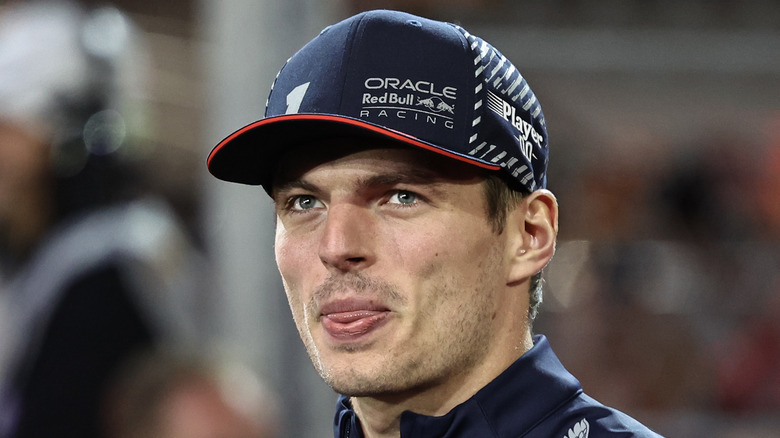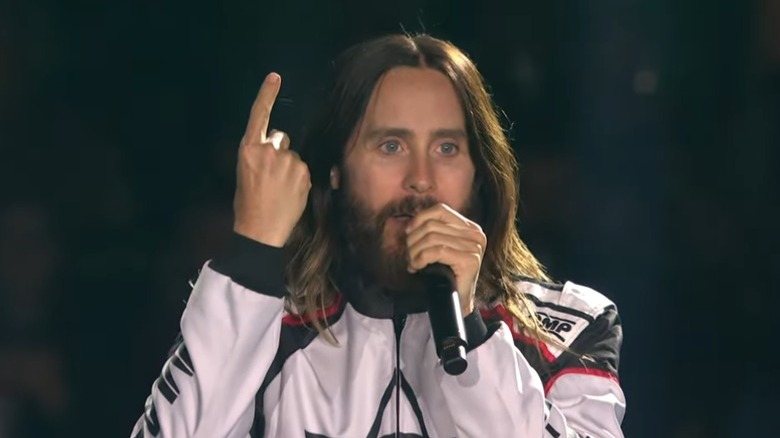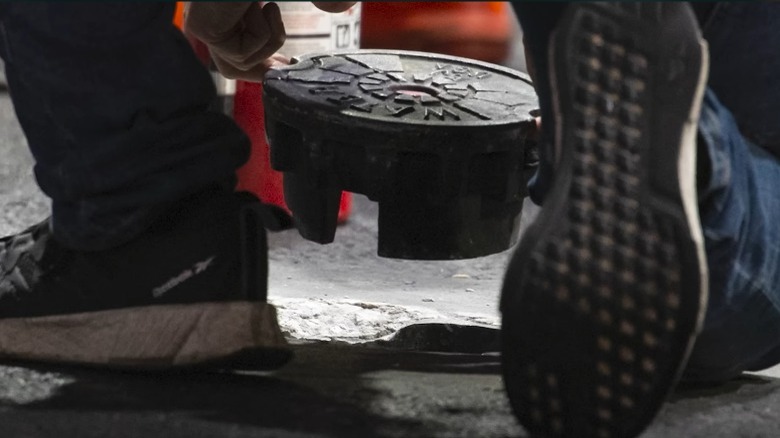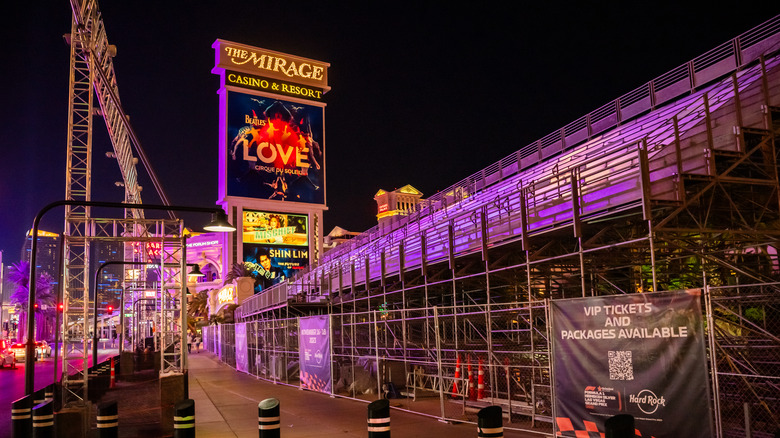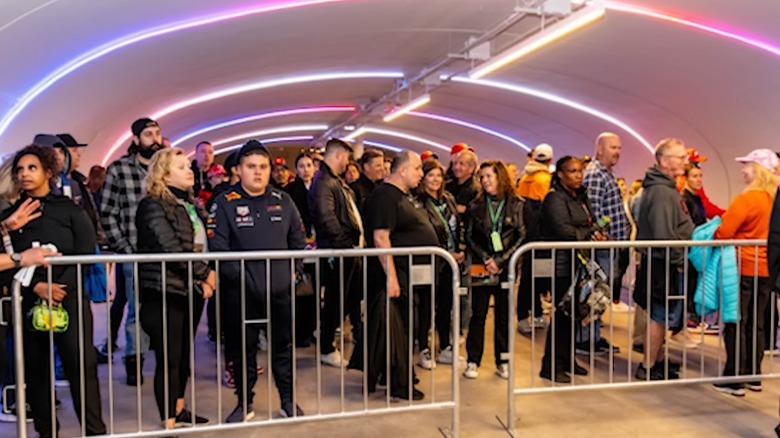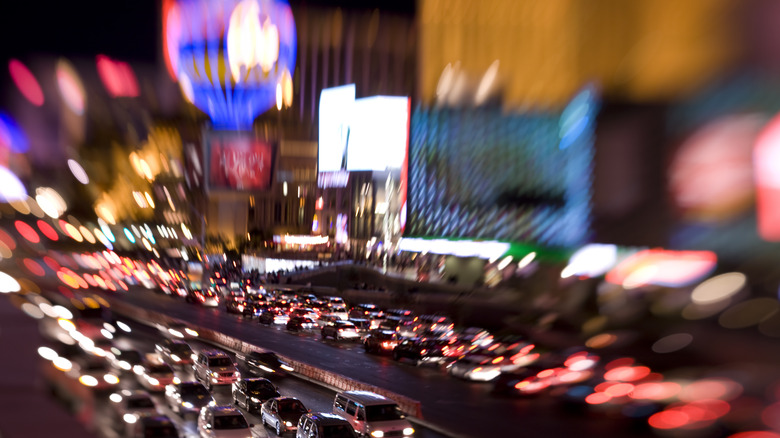What Made F1's First Trip To Las Vegas Such A Nightmare
Formula 1 racing came to Las Vegas, Nevada during the week of November 13 for the city's first-ever Grand Prix. The event took years of planning and required massive accommodations on the part of the infamous strip. People came from all over to watch some of the fastest F1 cars race along the bright lights of Sin City, but it didn't go off exactly as expected. Fans have complained about everything from the traffic that plagued the city over the weekend to the inappropriate amount of spectacle and overall poor planning. In short, it was a disaster.
These problems affected the prices surrounding the event as well. Ticket and hotel prices both started out quite high when it was first announced that F1 would be coming to Vegas last year, only to plummet in the final days. Arash Markazi of The Messenger reported that he was able to get an $18 hotel room at the Flamingo even though reserving that same room a year in advance would have cost him $899 for race week. He stated that ticket prices had dropped dramatically as well. "Tickets for Thursday's practice sessions were selling for around $100 on Wednesday night and tickets for Friday's qualifying were going for around $250 on the secondary market. Both events were selling for around $1,000 originally. A ticket to Saturday's race is still over $800 but they were over $1,600 just last month."
So what was the cause of this catastrophic fall in the Las Vegas Grand Prix's popularity? There were several factors.
Racers claimed Vegas doesn't understand F1 racing
One of the most obvious problems that racing fans had with the event was the overwhelming number of distractions. Dozens of live shows were put on during the event, including musical performances from Donny Osmond, Martin Garrix, Andra Day, John Legend, Journey, Keith Urban, Thirty Seconds to Mars, and many more. It seemed like the event organizers were interested in just about everything except for the actual racing. This added considerably to the chaos of the event.
Three-time F1 champion Max Verstappen complained that the people responsible for organizing the event didn't understand the sport they were supposed to be catering to. "I understand that fans, they need maybe something to do as well around the track, but I think it's more important that you actually make them understand what we do as a sport because most of them just come to have a party, drink, see a DJ play or a performance act," Verstappen said in an interview. "People, they come and they become a fan of what? They want to see maybe their favorite artists and have a few drinks with their mates and then go out and have a crazy night out. But they don't actually understand what we're doing or what we're putting on the line to perform." He then went on to explain that people would get a lot more out of F1 racing if the venues put more attention on the actual sport and the teams competing in it rather than "random shows."
Poor track conditions
A lot of the racers also complained about the state of the tracks themselves. The event preparation teams spent months converting the streets of Las Vegas into a track that Formula 1 cars could race on. The track goes down Las Vegas Blvd. before curving onto Harmon Ave. and then looping back along Koval Ln. and Sands Ave. A lot of construction went into making these popular streets race-worthy, but it seems that they still paled in comparison to circuits that were designed explicitly for F1. Several drivers complained that the tracks didn't have enough grip for their cars to handle curves the way they would on a normal circuit, but the biggest debacle took place during the first practice run.
Spanish Team Ferrari driver Carlos Sainz hit a manhole cover that was not properly secured during his trial run. The steel plate broke free from the ground and struck the underside of his car, severely damaging the vehicle's engine and sending sparks flying all over the track. Ferrari had to replace the car's entire engine, which led to Sainz receiving a 10-place grid penalty even though the incident wasn't his fault. Several fans were upset at the unfair judgment. Inside Edition reported that Sainz himself said the penalty wasn't acceptable, but that he would deal with it. Sainz eventually managed to pull ahead to sixth place, but lamented that he wasn't closer to the front and claimed that he just wanted to "forget this weekend."
Several events were delayed
There were other consequences to the incident with the manhole cover besides Sainz's penalty and his car's incredibly expensive repair. The track had to be shut down for hours while the manhole cover was repaired and every other manhole cover on the track was inspected to ensure that a similar incident didn't happen again. This wasn't handled particularly well by the event's organizers though.
Those who had paid to see the race were asked to leave the viewing areas shortly after the accident occurred. Photographer Kym Illman was present during the failed practice run. "About an hour after the incident happened, I returned to the media center and I could see people streaming out of the track," he said. "They weren't at all interested ... in hanging around, and then quite peculiarly, I entered the paddock and I managed to sneak in, and I don't know why everybody was being corralled, they weren't allowing them into the paddock. There were a lot of very angry people wanting to get in and out, but it was a stalemate."
The next practice was completed in front of empty stands. It lasted 90 minutes and didn't start until 2:30 AM Friday.
Fans want their money back
Fans were understandably upset that they didn't get to see the practice races that they had paid to watch. Renee Wilm, CEO of the Las Vegas Grand Prix, and Stefano Domenicali, CEO of Formula 1 issued a statement about the incident to address this. They impressed the importance of stopping the event in order to take these safety precautions but failed to apologize to the fans for their lost hours of entertainment. "We have all been to events, like concerts, games, and even other Formula 1 races, that have been [canceled] because of factors like weather or technical issues," they said. "It happens, and we hope people will understand."
To add insult to injury, officials representing the Grand Prix have only offered a $200 voucher to the Las Vegas Grand Prix gift shop as reparations to single-day ticket holders who were forced to leave the stands. Those with three-day passes received nothing even though they only saw roughly a third of the track time they had paid to see.
Now, a group of disgruntled fans have gathered together to file a class action lawsuit against the Las Vegas Grand Prix and its owner, Liberty Media. AP News reports that they are seeking a minimum of $30,000 in damages.
Traffic for locals was out of control
It wasn't just those who were attending the race who suffered, though. The local Las Vegas residents had plenty to complain about with the Grand Prix as well. It seems that the event organizers did very little to make accommodations for those who live and work in the areas surrounding the strip. Gridlocked traffic and poor parking conditions made commuting through the area a nightmare for locals.
"This race has made our lives a living hell," one of the Flamingo's servers told Markazi. "They started road work in April. They're telling us they might not be completely done with the teardown until just before New Year's Eve. And then what? Las Vegas is going to be back to normal for a few months before they get ready for the next race? Is this our new reality?" He also spoke to a bartender at The Venetian who said, "I don't think I can go through this every year. I'm just struggling to get through this week with the street closures and traffic. They're doing everything to get us to come to work during a time when everyone is saying 'Don't come to the Strip unless you have a ticket to the race.'"
This is a serious source of concern for locals, given that F1 has extended its deal to have Las Vegas host an annual Grand Prix until 2032.
